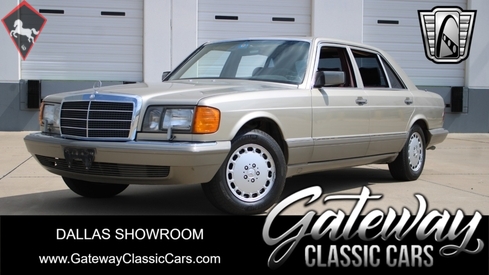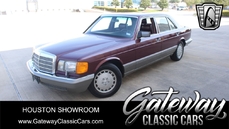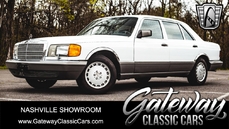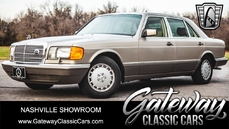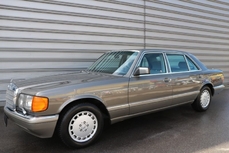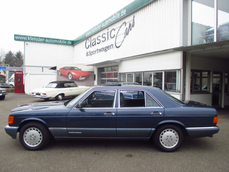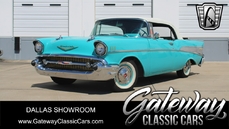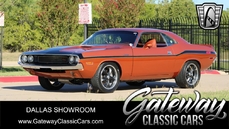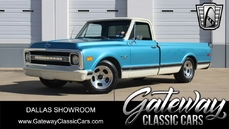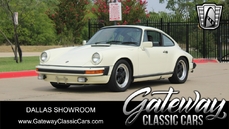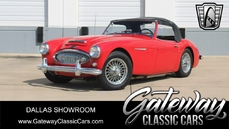Mercedes-Benz 420 SE/L w126 Sedan 4.2L V8 1988
General description :
Mileage : 164181
Interior Color : Burgundy
Exterior Color : Tan
VIN : WDBCA35D3JA419252
Transmission Description : 3 Speed Automatic
Doors : 4
Description : Gateway Classic Cars of Dallas is proud to digitally present this stunning 1988 Mercedes 420SEL for sale. This Mercedes for sale is truly a great example. That is something that you do not see anymore, and we are happy to help this fine machine find its new home. Powering this 1989 Mercedes 420SEL is a powerful 4.2L V8 that was built to cruise at high speeds for long distances. Did someone say Autobahn? Backing this powerplant is a 4-speed Automatic transmission, with smooth shifting and a quick exchange between gears you will know why this machine is at the top of the auto food chain. The Champagne exterior paint is just like looking into a mirror, looking like Mercedes just unveiled it and this is a great example of the care and maintenance that this machine has had. The interior is of red leather that is not only plush and comfortable that sleek and sexy looking as well. Don't miss out on an opportunity to own such a timeless classic! Serviced at Park Place Mercedes. Options on this 1988 Mercedes 420SEL include: Air Conditioning, Power steering, Power brakes, Power windows, Power locks, Am/FM radio/cassette, Power Sunroof, Tilt wheel, Driver and Passenger Airbags and Michelin radial tires wrapped around aluminum allow wheels. Don't miss this chance to own this timeless classic as it will not last long.
For more information, please call the Dallas location at 817-310-9400, or email us at Dallas@GatewayClassicCars.com.
1988 Mercedes-Benz 420 SE/L w126 Sedan 4.2L V8 is listed for sale on ClassicDigest in DFW Airport by Gateway Classic Cars - Dallas for $10000.
Car Facts
Car type : Car Make : Mercedes-Benz Model : 420 SE/L w126 Model Version : Sedan 4.2L V8 Engine size : 4.2 Model Year : 1988 Location : Dallas Vehicle Registration : Undefined
10000 $
Seller Information
Gateway Classic Cars - Dallas
Gateway Classic Cars - Dallas
214-974-3905
Gateway Classic Cars - Dallas
214-974-3905
Market Prices for Mercedes-Benz 420 SE/L w126 from 2023 to 2025
Months
Mercedes-Benz 420 SE/L w126 Selling Time to Price Correlation
0
6
12
18
24
30
36
42
48
54
0
5000
10000
15000
20000
25000
ClassicDigest Market-O-Meter for Mercedes-Benz 420 SE/L w126
Moderate Blue Chip Chart Busters
People who viewed this Mercedes-Benz 420 SE/L w126 also viewed similar Mercedes-Benz listed at ClassicDigest
Other cars listed for sale by this dealer
About Mercedes-Benz
In the annals of automotive history, the journey of Mercedes-Benz is a tale that unfolds with the ingenuity of its founding pioneers. In the year 1886, Karl Benz crafted the Benz Patent Motorwagen, a creation that would go down in history as the world's inaugural automobile. Unbeknownst to him, this moment marked the genesis of what would evolve into the most illustrious premium car manufacturer globally. The financial underpinning of this pioneering venture, interestingly, was provided by Karl Benz's wife, Bertha Benz, demonstrating a remarkable partnership that would set the tone for Mercedes-Benz's legacy.A parallel narrative emerged not far away, as Daimler-Motoren-Gesellschaft, founded by Gottlieb Daimler and Wilhelm Maybach, entered the scene. In 1901, they unveiled their automobile under the now-famous moniker "Mercedes," meaning "godsend" in Spanish. This name was bestowed upon the car at the behest of Emil Jellinek's daughter, the distributor for Daimler-Motoren-Gesellschaft. The wheels of innovation were set in motion.
Fast forward to 1926, a pivotal year that witnessed the merger of Daimler with Benz & Cie., culminating in the birth of Daimler-Benz. The amalgamation saw the adoption of "Mercedes-Benz" as the distinguished trademark for their automobiles, fusing the legacies of two visionary entities into one.
Contrary to perceptions of conservatism, the trajectory of Daimler-Benz unfolds as a chronicle of industry firsts. From the introduction of the honeycomb radiator to the float carburetor, and the pioneering implementation of four-wheel brakes in 1924, Daimler-Benz consistently pushed the boundaries of automotive innovation. The diesel-powered Mercedes-Benz 260 D in 1936 marked the inception of diesel engines in passenger cars. The iconic Mercedes-Benz 300SL Gullwing made history as the first car with direct fuel injection, albeit the Gutbrod's tiny 2-stroke engine can claim precedence.
Safety innovations became a hallmark, with Béla Barényi's patented safety cell design in the "Ponton"-models in 1951, featuring front and rear crumple zones. The W116 450SEL 6.9 saw the introduction of the Anti-Lock Brake system (ABS), another pioneering safety feature. From the first production airbags and beyond, the legacy of "firsts" continued to be etched into the fabric of Daimler-Benz.
Over its centennial journey, Mercedes-Benz has not merely produced cars but has sculpted automotive icons. The SSKL, 710 SSK Trossi Roadster, 770K Grosser, 540K Spezial Roadster, 300SL Gullwing, w100 600 Pullman, w111 280SE 3.5 Flachkühler, w113 230SL Pagoda, w109 300 SEL 6.3, and w201 2.3-16 Cosworth stand testament to the brand's commitment to engineering excellence.
The roaring Silver Arrows, or "Silberpfeile," including the W 25, W 125, W154, W165, and W196, created a legacy of dominance on the racetrack. These machines were not merely cars; they were expressions of precision, speed, and an indomitable spirit that left their competitors in the dust.
As Mercedes-Benz marches into the future, it does so not just as an automaker but as a custodian of a legacy, a torchbearer of innovation, and a beacon of automotive excellence. The road ahead is sure to witness the continued fusion of cutting-edge technology, timeless design, and an unwavering commitment to setting new standards in the world of automobiles.
One luminary figure who left an indelible mark was Béla Barényi, often heralded as the "father of passive safety" for his pioneering work in safety engineering. His patented safety cell design, featuring front and rear crumple zones, became a hallmark of Mercedes-Benz's commitment to occupant safety, setting new standards that reverberated throughout the automotive world.
Moving through the chronicles, the collaborative genius of Wilhelm Maybach, alongside Gottlieb Daimler, laid the foundation for Daimler-Motoren-Gesellschaft. Their innovations not only birthed the first Mercedes but established a culture of relentless pursuit of technological excellence that remains integral to Mercedes-Benz's DNA.
In the post-merger era of 1926, Ferdinand Porsche emerged as a prominent figure within Mercedes-Benz. His work on the Mercedes-Benz S-Type, a supercharged race car, garnered acclaim and set the stage for a legacy that extended far beyond the marque. Porsche's impact would later extend to his eponymous company, but his influence at Mercedes-Benz during those formative years was pivotal.
As the 20th century progressed, the legendary Rudolf Uhlenhaut emerged as a key figure. Uhlenhaut, an accomplished engineer and the driving force behind the iconic Silver Arrows, played a crucial role in Mercedes-Benz's dominance in motorsports. His engineering prowess and attention to detail were instrumental in creating some of the most formidable racing cars of the era.
In the latter half of the century, figures like Bruno Sacco, the head of design at Mercedes-Benz from 1975 to 1999, left an indelible imprint on the brand's aesthetic identity. Sacco's design philosophy, characterized by clean lines and timeless elegance, shaped iconic models like the W126 S-Class and the W201 190E, solidifying Mercedes-Benz's reputation for luxury and sophistication.
The narrative would be incomplete without acknowledging the contributions of engineers like Hans Scherenberg, whose leadership in the 1970s ushered in a new era of technological innovation at Mercedes-Benz. Scherenberg's tenure saw the development of groundbreaking technologies, including the Anti-Lock Brake system (ABS) and the introduction of airbags in production cars.
